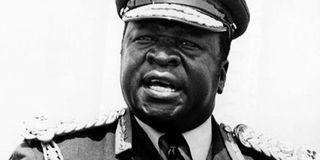Remembering some landmark events of July 4, 1976 – Part II

The council chamber was filled to capacity during the debate, with many in the audience hoping against hope that Field Marshal Idi Amin Dada (pictured) may unexpectedly show up in full regalia. File photo
What you need to know:
Foreign minister Juma Oris Abdalla returned home empty handed, despite succeeding to rally the African group and non-aligned countries on the side of Uganda. On arrival in Uganda, one of the first things he did was to dash to State House to brief Amin on the proceedings and outcome of the Security Council debate.
The UN Security Council met from July 9-14, 1976, at the request of OAU chairman and prime minister of Mauritius, Seewoosagur Ramgoolam, and held an acrimonious debate on Israel’s violation of Uganda’s sovereignty and territorial integrity. The council chamber was filled to capacity during the debate, with many in the audience hoping against hope that Field Marshal Idi Amin Dada may unexpectedly show up in full regalia.
Alas, the “Life President and Conqueror of the British Empire” disappointed many of his fans and opponents alike by his failure to attend. The OAU chairman was represented by Sir Harold Walter, foreign minister of Mauritius, and Israel by ambassador Herzog, a master of diatribe and invective who routinely attacked and ridiculed Arab delegations in the plenary like a wounded buffalo.
At the end of the debate on July 14, the council did not adopt the two draft resolutions, S/12139 tabled by Benin, Libya and Tanzania and S/12138 by UK and USA. The British resolution was put to a vote, but failed to obtain the necessary affirmative votes of nine council members.
The African draft resolution had eight preamble paragraphs and three operative paragraphs. The first preamble paragraph reads: “Having considered the contents of the telegram from the current chairman of the OAU, prime minister of Mauritius, Sir Seewoosagur Ramgoolam (S/12126) and the letter from the President of Uganda, Field Marshal Al hajj Dr Idi Amin Dada (S/12124).”
The three operative paragraphs read as follows:
“1. Condemns Israel’s flagrant violation of Uganda’s sovereignty and territorial integrity; 2. Demands that the Government of Israel meet the just claims of the Government of Uganda for full compensation for the damage and destruction inflicted on Uganda; 3. Requests the secretary general to follow the implementation of this resolution.”
Speaking on behalf of the African group on July 14, ambassador Salim Ahmed Salim of Tanzania informed council that he would not press the draft resolution S/12139 to a vote; the three sponsors did not insist on a vote, but they reserved their right to renew debate on the matter at an appropriate time. The item has technically remained pending ever since.
The failure by the Security Council to adopt the draft resolution reflected the contradictions surrounding the matter. Although a majority of council members condemned Israel’s violation of Uganda’s sovereignty and territorial integrity in their statements, they were at the same time mindful of the fact the Ugandans were stuck with a rogue regime, not unlike many decadent regimes which routinely exploit, oppress, suppress and torture wananchi in many African countries today!
If the council had adopted that well-intentioned and principled draft resolution tabled by Benin, Libya and Tanzania, it would obviously have been interpreted by Amin as victory and a stamp of approval for his regime which, needless to say, had lost all credibility and legitimacy in Uganda, which reminds me of similar regimes led by the likes of Yahya Jammeh of the Gambia, Pierre Nkurunziza of Burundi, Robert Mugabe of Zimbabwe and many others in Africa.
The endgame begins
Foreign minister Juma Oris Abdalla returned home empty handed, despite succeeding to rally the African group and non-aligned countries on the side of Uganda. On arrival in Uganda, one of the first things he did was to dash to State House to brief Amin on the proceedings and outcome of the Security Council debate.
According to an inside source, it was dangerous to tell Amin anything which may displease or annoy him! The minister had to walk a tight rope and sugarcoat his report and convince Amin that his mission was accomplished with flying colours! Unlike others, Amin did not pretend and hide his wish to rule for life.
Why did members of the Security Council act the way they did? While a majority of council members supported the position of the African group, at the end of the debate most were reluctant to take a concrete decision. After some consultations draft resolution S/12139 was strangely not put to the vote.
What transpired during the consultations are matters which make diplomacy both interesting and frustrating. Diplomats often refrain from calling a spade a spade in public because of national interest or because it may violate an international principle, such as, non-interference in the internal affairs of states or the principle of sovereign equality of states which in theory puts the USA, China, Gambia, Russia, Brazil, Uganda and Maldives at par.
The action council took was a victory of principle over expediency, emotion and populism. It was a triumph for diplomacy and the mark of statesmanship and good leadership. The easy way out would have been to condemn Amin and welcome the Israeli raid which would have been popular, but such is the preferred method of those who lead by impulse and whims, not by reason. What is popular is not perforce right.
Operation Thunderbolt marked the beginning of the end of the Amin regime, but it would take another three years before the regime finally collapsed like the biblical tower of Babel. What is lamentable is the fact that Ugandans, especially our political leaders, do not seem to have learnt any lessons from the mistakes and excesses of the Amin regime. For example, intimidation, impunity and the use of force continue to be the preferred method of resolving political differences in Uganda, instead of dialogue. As a wise man said, history repeats itself, first as a tragedy and then as a farce! I fear Uganda has now reached the stage of a farce.
May the Lord have mercy!
Mr Acemah is a political scientist, consultant and a retired career diplomat. [email protected]




